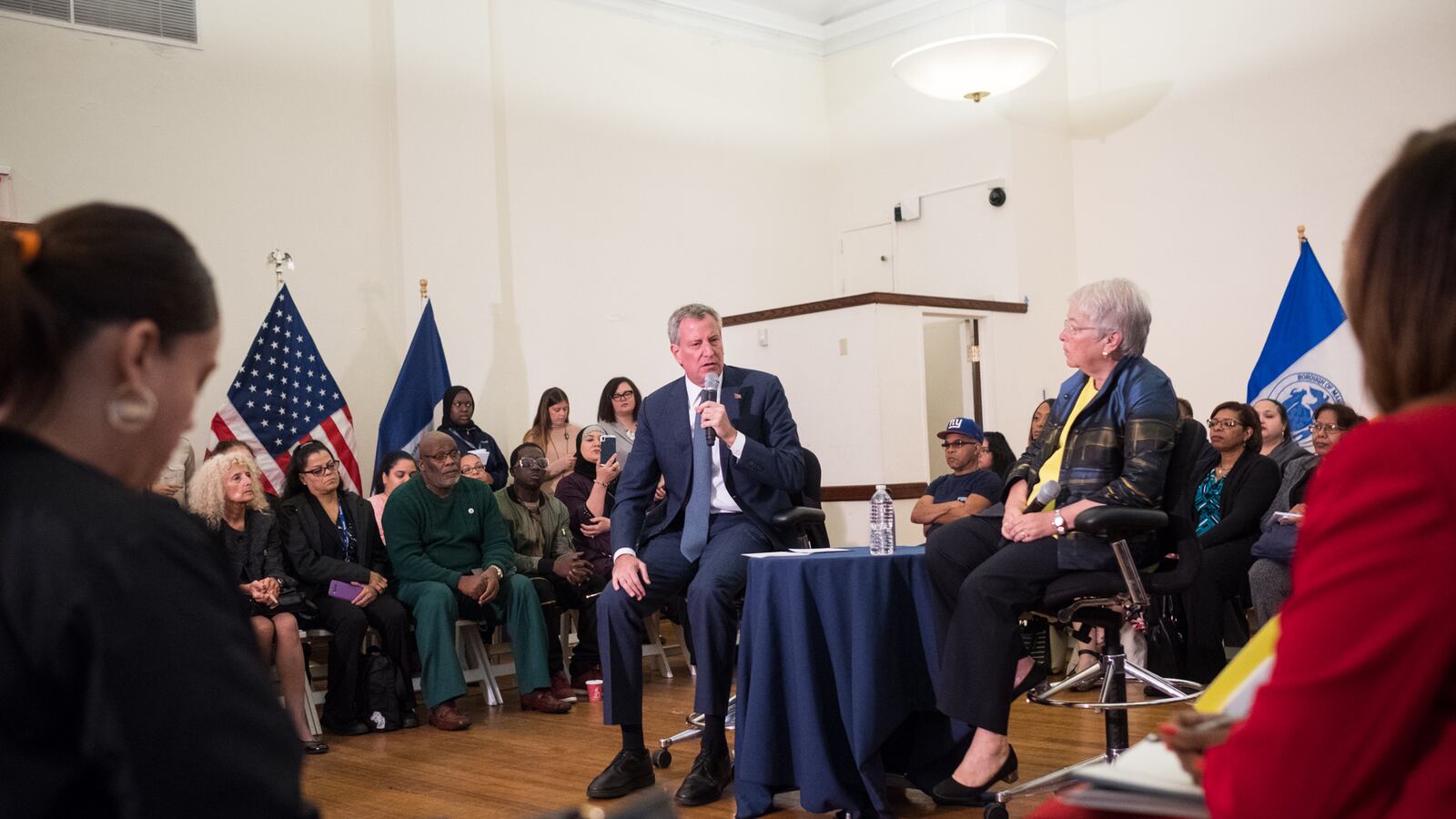Less than a week after a stabbing in a Bronx school left one student dead and another seriously injured, parents grilled Mayor Bill de Blasio at a public forum on his safety policies and what he is doing to control violence in their schools.
One by one, parents at a Harlem forum on Monday stood to question the mayor and schools Chancellor Carmen Fariña: Would the city deploy more school psychologists? How can parents get better information on the safety of their schools? What happens if the police department’s school safety agents are not effective in patrolling a school?
The meeting, which was sometimes tense, was the first time the pair publicly heard from parents in the aftermath of the first student killing inside a school building in nearly 25 years.
“Anyone who’s had a child in our schools felt that moment very deeply,” de Blasio said in his opening remarks. “People all over the city want to know that every action is being taken.”
The killing at the Urban Assembly School for Wildlife Conservation comes at a sensitive moment for de Blasio, who is running for reelection and has faced a drumbeat of criticism for school discipline reforms that discourage suspensions and other punitive responses to student misbehavior. On Monday, de Blasio repeatedly reassured a group of parent leaders — including PTA presidents and community education council members — acknowledging their concerns about school safety without retreating from his own policies.
Some systems across the country are wrestling with school discipline reforms, with the debate largely split between those who advocate for strict discipline and those, like the mayor, who believe that such policies are imposed much more harshly on students of color and fail to address underlying problems.
Building on de Blasio’s emphasis on “restorative” approaches, all schools will hold weekly trainings for the next three weeks to reinforce de-escalation and anti-bullying strategies, Chancellor Fariña said, and will also receive refreshers on how to appropriately report cases of bullying.
Officials said those training materials are still being created and details will be distributed to schools this week. “This will go a long way in reinforcing what we’ve already put in place,” Fariña said.
But Gigs Taylor-Stephenson, a parent who attended the forum, expressed skepticism that additional training would be enough. Taylor-Stephenson, the PTA president at Manhattan’s Wadleigh Secondary School for the Performing & Visual Arts — a school in the city’s Renewal turnaround program — said she has seen training have little effect in the past.
“People go to training, and sign up,” she said in an interview, referring to one program designed to help staff welcome parents and get them involved in the school. “But they don’t implement it in schools.”
Throughout the morning, de Blasio appeared to be particularly sensitive to concerns that schools might not immediately respond to reports of bullying — a criticism that has emerged at the Wildlife Conservation school.
“We very much are sending a message but we will send it even more rigorously to everyone in the school community: Never ignore an instance of bullying,” de Blasio said. If parents have a concern about school safety, he later added, “they got to know who to talk to and we have to do a better job of making that go-to person available.”
The mayor did not offer new facts about last week’s stabbing, and said the public should hold off on drawing conclusions until the investigation is complete. Before a student was killed, parents at that school said there had been breakdowns in school safety, and officials had failed to properly respond to incidents of bullying. After the stabbing, frustrated parents confronted school safety officers who refused to let them in the building or pick up their children.
On Monday, other parents raised concerns that their own student’s schools feel chaotic — and that staff members sometimes struggle to intervene. Speaking at the forum, Renesha Westbrooks-Martinez, a parent at P.S. 45 in Brooklyn, described a visit where she saw students shoving each other and papers strewn across the room. “I’m like, ‘Oh my goodness the teacher has no control,’” she said.
In response, de Blasio said disorderly classrooms are “something we don’t accept,” though Fariña later suggested that “a lot of what happens in classrooms that sometimes can look wild is interactive learning.”
“Certainly, if kids are not being disciplined, or not paying attention, that’s on us,” Fariña added. “But a lot more parents need be aware that we really want to hear a lot more talking in classrooms, we want to hear students talking to each other, working together.”
Speaking with reporters after the forum, Westbrooks-Martinez said what she described was a disorderly classroom, not one where students were learning from each other.
“I know the difference,” she said.

